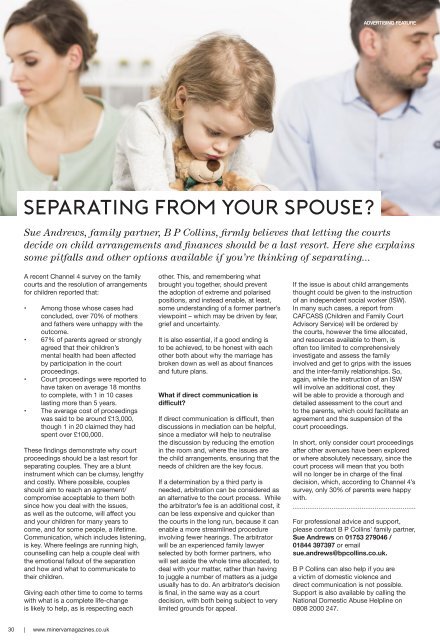You also want an ePaper? Increase the reach of your titles
YUMPU automatically turns print PDFs into web optimized ePapers that Google loves.
ADVERTISING FEATURE<br />
Separating from your spouse?<br />
Sue Andrews, family partner, B P Collins, firmly believes that letting the courts<br />
decide on child arrangements <strong>and</strong> finances should be a last resort. Here she explains<br />
some pitfalls <strong>and</strong> other options available if you’re thinking of separating...<br />
A recent Channel 4 survey on the family<br />
courts <strong>and</strong> the resolution of arrangements<br />
for children reported that:<br />
• Among those whose cases had<br />
concluded, over 70% of mothers<br />
<strong>and</strong> fathers were unhappy with the<br />
outcome.<br />
• 67% of parents agreed or strongly<br />
agreed that their children’s<br />
mental health had been affected<br />
by participation in the court<br />
proceedings.<br />
• Court proceedings were reported to<br />
have taken on average 18 months<br />
to complete, with 1 in 10 cases<br />
lasting more than 5 years.<br />
• The average cost of proceedings<br />
was said to be around £13,000,<br />
though 1 in 20 claimed they had<br />
spent over £100,000.<br />
These findings demonstrate why court<br />
proceedings should be a last resort for<br />
separating couples. They are a blunt<br />
instrument which can be clumsy, lengthy<br />
<strong>and</strong> costly. Where possible, couples<br />
should aim to reach an agreement/<br />
compromise acceptable to them both<br />
since how you deal with the issues,<br />
as well as the outcome, will affect you<br />
<strong>and</strong> your children for many years to<br />
come, <strong>and</strong> for some people, a lifetime.<br />
Communication, which includes listening,<br />
is key. Where feelings are running high,<br />
counselling can help a couple deal with<br />
the emotional fallout of the separation<br />
<strong>and</strong> how <strong>and</strong> what to communicate to<br />
their children.<br />
Giving each other time to come to terms<br />
with what is a complete life-change<br />
is likely to help, as is respecting each<br />
other. This, <strong>and</strong> remembering what<br />
brought you together, should prevent<br />
the adoption of extreme <strong>and</strong> polarised<br />
positions, <strong>and</strong> instead enable, at least,<br />
some underst<strong>and</strong>ing of a former partner’s<br />
viewpoint – which may be driven by fear,<br />
grief <strong>and</strong> uncertainty.<br />
It is also essential, if a good ending is<br />
to be achieved, to be honest with each<br />
other both about why the marriage has<br />
broken down as well as about finances<br />
<strong>and</strong> future plans.<br />
What if direct communication is<br />
difficult?<br />
If direct communication is difficult, then<br />
discussions in mediation can be helpful,<br />
since a mediator will help to neutralise<br />
the discussion by reducing the emotion<br />
in the room <strong>and</strong>, where the issues are<br />
the child arrangements, ensuring that the<br />
needs of children are the key focus.<br />
If a determination by a third party is<br />
needed, arbitration can be considered as<br />
an alternative to the court process. While<br />
the arbitrator’s fee is an additional cost, it<br />
can be less expensive <strong>and</strong> quicker than<br />
the courts in the long run, because it can<br />
enable a more streamlined procedure<br />
involving fewer hearings. The arbitrator<br />
will be an experienced family lawyer<br />
selected by both former partners, who<br />
will set aside the whole time allocated, to<br />
deal with your matter, rather than having<br />
to juggle a number of matters as a judge<br />
usually has to do. An arbitrator’s decision<br />
is final, in the same way as a court<br />
decision, with both being subject to very<br />
limited grounds for appeal.<br />
If the issue is about child arrangements<br />
thought could be given to the instruction<br />
of an independent social worker (ISW).<br />
In many such cases, a report from<br />
CAFCASS (Children <strong>and</strong> Family Court<br />
Advisory Service) will be ordered by<br />
the courts, however the time allocated,<br />
<strong>and</strong> resources available to them, is<br />
often too limited to comprehensively<br />
investigate <strong>and</strong> assess the family<br />
involved <strong>and</strong> get to grips with the issues<br />
<strong>and</strong> the inter-family relationships. So,<br />
again, while the instruction of an ISW<br />
will involve an additional cost, they<br />
will be able to provide a thorough <strong>and</strong><br />
detailed assessment to the court <strong>and</strong><br />
to the parents, which could facilitate an<br />
agreement <strong>and</strong> the suspension of the<br />
court proceedings.<br />
In short, only consider court proceedings<br />
after other avenues have been explored<br />
or where absolutely necessary, since the<br />
court process will mean that you both<br />
will no longer be in charge of the final<br />
decision, which, according to Channel 4’s<br />
survey, only 30% of parents were happy<br />
with.<br />
For professional advice <strong>and</strong> support,<br />
please contact B P Collins’ family partner,<br />
Sue Andrews on 01753 279046 /<br />
01844 397397 or email<br />
sue.<strong>and</strong>rews@bpcollins.co.uk.<br />
B P Collins can also help if you are<br />
a victim of domestic violence <strong>and</strong><br />
direct communication is not possible.<br />
Support is also available by calling the<br />
National Domestic Abuse Helpline on<br />
0808 2000 247.<br />
30 | www.minervamagazines.co.uk


















